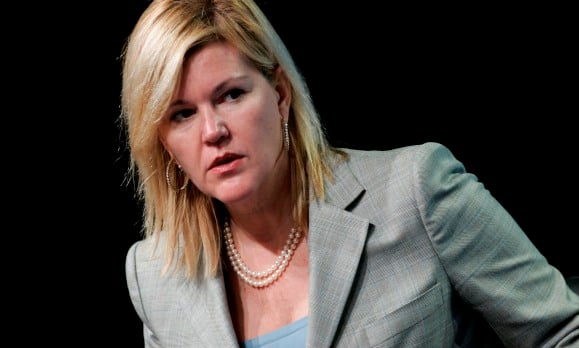Defaults in the $3.7 trillion municipal-bond market this year will again prove Meredith Whitney wrong.
Defaults in the $3.7 trillion municipal-bond market this year will again prove Meredith Whitney wrong, falling short of the “hundreds of billions of dollars worth” the banking analyst predicted for 2011.
Debt on which payments are missed may rise as much as 15 percent to $2 billion in 2012, according to John Hallacy, a Bank of America Merrill Lynch strategist, as a full recovery from the longest recession since the 1930s eludes some states and cities.
“Given the remaining effects of the slowdown in the economy, you could have a marginal increase in defaults,” said Hallacy. “I don't see it being a spike.”
Whitney, who gained prominence after predicting correctly in 2007 that Citigroup Inc. would cut its dividend, told the CBS Corp. television program “60 Minutes” in December 2010 that there may be 50 to 100 “sizeable” defaults in 2011.
The year was indeed marked by the largest municipal bankruptcy filing in U.S. history. Jefferson County, Ala., sought court protection after struggling with $3.1 billion of sewer-system debt. Harrisburg, Pa., also filed because of burdensome incinerator bonds. A federal judge rejected the move, ruling it wasn't authorized.
Defaults involving missed payments totaled about $1.7 billion of face value in 2011 by Hallacy's estimate. The total was $2.6 billion according to Matt Fabian, a managing director at Concord, Mass.-based Municipal Market Advisors, excluding tax-exempt debt in AMR Corp.'s bankruptcy.
Wide Margin
“Meredith Whitney blew her call by a great margin, but they still could go up,” said Richard Larkin, director of credit analysis at Herbert J. Sims & Co. in Iselin, N.J.
New York-based Whitney didn't return a telephone call seeking comment.
Absent widespread defaults, munis earned more than stocks, Treasuries and commodities last year as state and local governments cut spending and tax revenue rose for eight straight quarters to Sept. 30, the longest string of gains since 2008, the U.S. Census Bureau said Dec. 20.
Top-rated 10-year muni yields fell as low as 1.77 percent Dec. 30, the least since data compiled by Bloomberg began in January 2009. The market returned 10.7 percent through Dec. 30 while Treasuries earned 9.8 percent, according to Barclays Capital indexes that track prices and interest income. The Standard & Poor's 500 Index of stocks was unchanged in 2011 and the S&P GSCI Spot Index of commodities rose 2.1 percent.
Even when adjusted for the risk of price volatility, municipal bonds beat Treasuries, investment-grade corporate debt and junk bonds, according to data compiled by Bloomberg.
Continued Struggle
Some state and local borrowers will continue to struggle to balance their books this year as the recovery sputters, Larkin said. U.S. gross domestic product grew at a 1.8 percent annual pace in the third quarter, the government said Dec. 22, less than the 2 percent initially estimated.
California, New York, Missouri and Washington have midyear budget deficits, according to the National Conference of State Legislatures. Detroit may run out of cash by April and faces a possible state takeover as Mayor Dave Bing and City Council members disagree on how to close a $155 million deficit.
“We're not out of the woods yet,” Larkin said. “Defaults could go higher because the economy isn't helping things.”
Larkin's firm doesn't expect defaults to exceed $20 billion this year, with less than a fourth of that among state and local governments. The rest will be in riskier special-purpose debt such as revenue-backed industrial-development, housing, nursing- home and airport bonds.
Vulnerable Issues
Investors still face vulnerability in lower-rated bonds and from cities that haven't dealt with revenue declines, said Richard Ciccarone, managing director with McDonnell Investment Management in Oak Brook, Ill. He said about 2 percent of the 700 cities he follows don't have enough cash to cover 30 days of expenses.
“There's a probability that marginal players will default,” said Ciccarone. “I don't think they're going to decrease.”
Richard Lehmann, publisher of Distressed Debt Securities newsletter in Miami Lakes, Fla., calculates 2011 defaults at $24 billion worth of bonds, up from about $5 billion in 2010. He includes missed payments and times when borrowers used reserves to pay, plus tax-exempt airport-improvement debt tied to AMR's bankruptcy and muni bonds backed by tobacco-company revenue.
That measure of defaults may be at least as high or more in 2012, said Lehmann. He predicts half the $113.8 billion of tobacco bonds outstanding may default if “they have to invade debt reserves.”
Smaller Payments
The bonds are backed by payments from cigarette makers to state and local governments to settle suits over smoking-related health-care costs. Lehmann said the payments, linked to tobacco consumption, have fallen as people quit smoking and cigarette companies withheld money in challenges to the terms of the settlements.
Ohio, California and Virginia had to make payments on tobacco bonds from reserves in 2011, said Lehmann.
Other risks facing the municipal market this year are a possible Detroit bankruptcy, a slowdown in China, a collapse of the European currency union and the looming expiration of U.S. tax cuts, Fabian of Municipal Market Advisors said by e-mail.
“It's a much-less-predictable year than ever,” he said.
--Bloomberg News--







